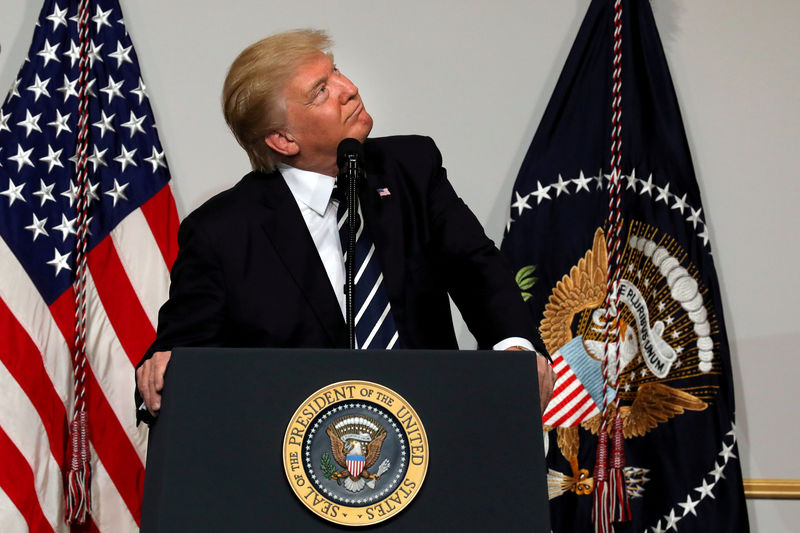By Jamie McGeever
LONDON (Reuters) - The U.S. dollar and Treasury yields slid on Thursday and were on track for their biggest weekly declines this year, after U.S. President Donald Trump said that he would like to see interest rates stay low and that the greenback was too strong.
Surprisingly strong Chinese trade figures and Trump's remarks that the United States will not name China a currency manipulator helped boost Asian stocks. But the falling dollar and bond yields weighed on European markets.
U.S. futures pointed to a slightly lower open on Wall Street too.
"The dollar slid after Trump commented that the currency had risen too high ... (and) saying that he was in favour of low interest rates policy," Mizuho strategists wrote in a note to clients on Thursday.
"The U.S. president also appeared to move away from a more confrontational tone against China by acknowledging the country has not intervened to weaken its currency. Following his comments, Treasury yields fell to their lowest this year."
The dollar index, which tracks the greenback against a basket of six trade-weighted peers, fell 0.6 percent to 100.07. The benchmark 10-year U.S. Treasury yield slid to a five-month low of 2.22 percent.
That put the dollar on course for a fall of more than 1 percent and the 10-year yield down 13 basis points this week. That would mark the dollar's steepest weekly fall since before the U.S. presidential election in November and the sharpest yield drop since June last year.
Most financial markets are closed on Friday for the Good Friday holiday, and trading volumes on Thursday have been much lighter than usual.
Escalating fears of a new weapons test by North Korea kept investors on edge too, as a U.S. carrier group sails towards the area. Concern over the situation in the area has sent the cost to protect South Korean government debt against default soaring to 9-1/2 month highs.
European stocks were lower on Thursday. The pan-European index of leading 300 stocks fell 0.5 percent to 1,496 points, Germany's DAX was down 0.4 percent and Britain's FTSE 100 was down 0.6 percent.
European bank stocks were among the hardest hit, down more than 1 percent as the fall in longer-dated bond yields flattened the yield curve. The shrinking premium of long-dated yields over shorter-dated ones hurts banks' profitability.
TRUMP REVERSALS
In an interview with The Wall Street Journal, president Trump said he would like to see U.S. interest rates stay low and that the dollar was "getting too strong" and would eventually hurt the economy.
In apparent reversals from previous positions, he also said China isn't manipulating its currency - doing so would hurt talks with Beijing on dealing with North Korea - and that he wouldn't rule out re-nominating Federal Reserve Chair Janet Yellen once her four-year term is up next year.
Asia MSCI's broadest index of Asia-Pacific shares outside Japan was up about 0.5 percent, while the yen's earlier strength helped push Japan's Nikkei down 0.7 percent.
China's trade surplus with the United States, another bone of contention for Trump, widened in March from February, customs data showed on Thursday. China's overall trade surplus rose in March after logging its first deficit in three years in February.
As European trading got underway, the dollar clawed back some of its earlier losses. It was down 0.1 percent against the yen at 108.90 yen, after touching a five-month low of 108.70. The euro was a touch weaker at $1.0650, after rising as high as $1.0677.
The euro and euro zone bond yields were also vulnerable to investor unease around the first round of the French presidential election on April 23. Markets are uneasy about the victory chances of both far-right leader Marine Le Pen, who has pledged to seek to take France out of the euro, and far-left candidate Jean-Luc Melenchon, who has seen his support climb in the polls.
"I think the price action in core yields is mainly shaped by the rising geopolitical concerns but also French election nerves increasing safe-haven flows," said ING strategist Martin Van Vliet.
In commodities, oil prices fell on concerns about rising U.S. output. U.S. crude CLc1 slipped 0.3 percent to $52.95 a barrel, extending Wednesday's 0.5 percent loss that saw it break a six-session winning streak.
Global benchmark Brent was also down 0.3 percent at $55.70, failing to make up any of Wednesday's 0.7 percent loss.

Gold pared earlier gains but hovered near a five-month high hit earlier in the session. The precious metal was up around 0.1 percent at $1,287 an ounce.